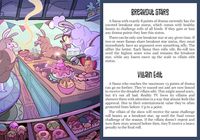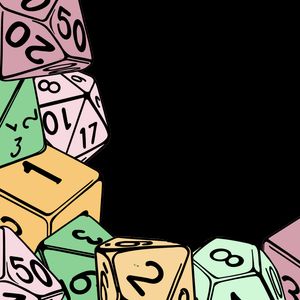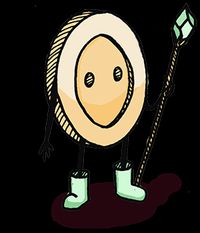Dec 16, 2022
Happy festive season, one and all! These long nights are spooky. Perfect for telling stories full of adventure and peril and humour and hope. There’s magic in the air, and if you listen very, very carefully you might just hear the sound of a thousand hastily-homebrewed demonic snowmen being born. ‘Tis the season!
On this fine Christmas eve-eve-eve-eve-eve-eve-eve-eve-EVE I have some sweet bits of news, one spicy mulled hot take, and a thoroughly toasted game preview for Drama Llamas. Speaking of which…
Drama Llamas has over 200 prelaunch followers at the time of writing. This is very exciting. Much has been written by the game dev community about how many prelaunch followers guarantee your project WILL fund based on your final target, the day of the week you launch, and the phase of the moon on the day you were born. It’s all a bit divinatory, but the signs and portents bode well.
Not DnD podcast! I spent a cozy half hour chatting with Jessica over at the Not DnD podcast a couple of weeks ago about games, early playing experiences, and the development of my latest release. It’s pretty intimidating to be billed on the episode after Michael Sands (of Monster of the Week fame), but also quite awesome. You can listen to that chat by clicking this here link.
Kick Agency! The newshounds over at Kick Agency kindly gave Drama Llamas and a couple of my older games a write up. As we say in the old country: “nice one, la!”
There are nearly 100 of you! Welcome new friends and old, and thanks so much for reading. Please do tell your friends.
Hot take: you can’t monetise the bits of TTRPGs that actually matter, but you can make them harder to access
If the polarised camps on Twitter are to be believed (spoilers: they’re not), we’re all either brainwashed D&D zombies, slobbering over each new WotC release with submissive, uncritical glee, our hearts and wallets wide open, or we’re brooding indie game developers who exclusively play games by other indie game developers, pouring the sticky ichor of our cherished bitterness out over the philistines on the other side of the fence. The truth is, of course, many of us straddle both worlds. I run a weekly D&D 5e campaign and I write and play indie games. I’m not looking to pick a lane any time soon, although I’ll admit that THAT Dicebreaker article gave me pause this week.
If you don’t know what I’m talking about you can find your answers here. The article is, of course, worth a read and contains many more details than I’ll go into here, but the main nugget is this: the CEO of Wizards of the Coast, aka WotC, who own D&D, said to the CEO of Hasbro, their parent company, that she thinks “the brand is really under-monetised”. This sent a shiver down the spines of the more left-leaning part of D&D’s player community. Myself included. Perhaps without cause, though? After all, a key word in the quote appears to be “brand”. She didn’t say the game was “under-monetised”, and the two are very different things. Arguably barely related at times.
Reading on, it seems the execs want to expand “the brand” in three key areas: toys and collectibles, video games, and film and television. Some of these things I definitely won’t engage with, and will be happy enough for those who want to do so without me (you do you, figurine fans!). Others I will likely engage with in a low stakes way when I feel like it. I plan on seeing the D&D movie, safe in the knowledge that I won’t care even a little bit if it’s rubbish. Because it’s not going to erase 5e from existence, which would be inconvenient for me and my players, and it’s not going to change anything about the story we’re telling together, which is what I really care about. Yeah, it’d be nice if WotC focused on making the game better and more inclusive instead of getting distracted by what will likely be a series of money-grubbing, focus-grouped-to-death efforts of dubious quality. But truthfully 5e does what I need it to right now with a few progressively-minded tweaks (my orcs are a diverse people with complex emotional lives, thank you.) It works just fine when I want to run a fantasy adventure story, and when that’s not what I want I’ll use a different system. I own many. Calling out from my shelves. Begging to be cherished. To be held.
There’s still a rub, though, isn’t there? For one, mine is a privileged perspective. Others will no doubt have changes they’d like to see made to what is still the biggest and most-played role-playing game in the world, and no doubt they will be hoping this nonsense doesn’t halt the progress that’s been made. And that’s just part of the unclean feeling that persists. Inescapably the attitude on display here is at odds with what I love and cherish about these kinds of games: their surprising capacity to create meaningful experiences which cost nothing but time. For all that the rule books cost money, the hours upon hours of joy and creative flow and bonding they facilitate feel like more than a bargain. I’ve played over 100 hours of D&D in the last year and at this point the £50 I paid for the player’s handbook 3 years ago is a distant memory. There’s also something about the kind of play these games offer that feels so human and, to me, essentially anti-capitalist.
Shared storytelling is as old as humanity itself. It’s in our bones. As children we feel the truth of it. No one tells us to make-pretend with our friends, we just do. And when we do, what we create together belongs to all of us and to none of us. Shared and cherished, our stories cost nothing and mean everything. Even if we grow up to forget these simple truths we can always rediscover them. TTRPGs are a fantastic vehicle for that remembering to happen.
I’d like to say that all the above is so inherent to who we are that it can’t be taken away from us. In fact, I often do say that. Tears in my eyes, making those around me uncomfortable by sheer force of earnestness. But, at least in the case of D&D, I suspect that the money people could make it all harder to access. How? Well, to name one scenario that comes to mind: they could crack down on alternatives to dndbeyond now that that service is owned by WotC and is developing its own VTT. They could make unreasonable demands on other similar sites or virtual table tops (VTTs), like Roll 20, who have licensing agreements in place, forcing them out. Hasbro are well placed to monopolise the VTT and interactive character sheet part of the D&D market, which make the game so much more accessible to new players and enrich the sort of online play which has become the norm for many groups. And once a monopoly is in place capitalist logic dictates price rises. How much are you willing to pay for a subscription to D&D? I’m sure Hasbro would like to know.
I should end on some good news. I’ve got two offerings: I’ve certainly been known to be wrong, and, if not, there’s a galaxy of other excellent games waiting to be discovered. Begging to be cherished. To be held.
Game Preview



